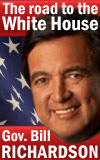 Michigan will likely holds its presidential primary on Jan. 15, jumping ahead of South Carolina and Florida and tossing a new monkey wrench into the plans of presidential campaigns.
Michigan will likely holds its presidential primary on Jan. 15, jumping ahead of South Carolina and Florida and tossing a new monkey wrench into the plans of presidential campaigns.
Though the deal isn’t yet official, a number of news services reported over the weekend that officials from both major parties had agreed to hold their primaries that day.
For Gov. Bill Richardson, it’s bad news. He hasn’t spent hardly any time in Michigan, has little name recognition there and wasn’t even worth mentioning in a Detroit News article on the most recent poll conducted there.
That poll, conducted earlier this month by the newspaper and a local television station, found that, when Al Gore was included, he was winning with 36 percent of the vote to Hillary Clinton’s 32 percent, Barack Obama’s 16 percent and John Edwards’ 8 percent. Without Gore in the poll, Clinton had 45 percent, Obama had 26 percent and Edwards had 16 percent.
The newspaper didn’t release the totals for the other candidates in the race, including Richardson.
Michigan would be the first large state to hold its primary, making Nevada – a critical state for Richardson – less influential in the process. Having to compete in a large media market like Detroit’s at such an early date makes the road harder for candidates with less money.
The move to Jan. 15 will require New Hampshire, by state law, to hold its primary on Jan. 8 or earlier and might push Iowa, unless it decides to ignore its own state law, to hold its caucuses in December.
So there’s a lot of uncertainty in the process right now.
Michigan’s change comes after the recent decision by Florida Republicans to jump ahead of South Carolina’s Jan. 29 primary and hold their own on Jan. 19. That had already prompted speculation that New Hampshire might hold its primary on Jan. 8, since it’s tradition to hold it on Tuesday, but officials in the Granite State were leaning toward a Saturday primary on Jan. 12 to keep Iowa in January, until the news from Michigan made that illegal.
No one actually wants to push the first contests into December.
Where will this end? It’s a little early to tell. What’s likely is that, during their conventions next year, Democrats and Republicans will be talking about reform of the nominating systems for presidential candidates.
